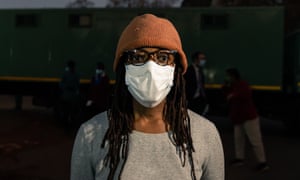She talks about protest, Africa’s film industry and her hopes for her country

Four days after learning that her novel, This Mournable Body, had been longlisted for the Booker prize, Tsitsi Dangarembga found herself sitting on the concrete floor of a police cell. The 61-year-old author and film-maker had been arrested with a friend in the Zimbabwean capital of Harare for protesting about government corruption.
“There had been a call out for a demonstration on social media for weeks, and people were excited. You could feel the energy,” she says. “I had expected there would be protesters with placards lining the streets but there was absolutely nobody, because a couple of weeks earlier the government had declared it an insurrection, and by the time the announcement was made the army had been deployed.”
She was released on bail a day later, charged with intention to incite public violence and acts of bigotry, and is due to appear in court in September. Is she afraid? “We were treated well, but yes I am afraid,” she says. “There were increased abductions leading up to the demonstration, but these were mainly opposition politicians and activists and I’m neither: I’m a writer and a film-maker but I’m also a responsible citizen of Zimbabwe, and I thought, even if there was a crackdown, the citizen still has space in law.”
Dangarembga is speaking from her home in a suburb of Harare, where for months a coronavirus curfew has confined citizens to their homes from 6pm to 6am. She fears that it is more of a power grab than a public health initiative. “It’s exactly the sort of curfew we had in Rhodesia. I don’t understand why a public health situation requires a military solution.”

This Mournable Body is the third part of a trilogy, published over a period of more than 30 years, which reflects sickness in the body politic of an earlier era through the life story of a village girl called Tambudzai (“Tambu”). The first instalment, Nervous Conditions, was published in 1988 and charted Tambu’s early childhood in 60s and 70s Rhodesia, where a kindly uncle gives her a chance to better herself by taking her away to his mission to be educated. The novel won the Commonwealth Writers’ prize, was widely translated and became a key text in postcolonial literature. It wasn’t until 18 years later that The Book of Not followed Tambu through her teenage years at the Young Ladies College of the Sacred Heart, and now This Mournable Body finds her bereft in her 30s, struggling to squeeze her feet into Lady Di pumps and make a life in the postcolonial Zimbabwe of the 1990s. Her sister has lost a leg in the war for independence and “now fends for two liberation struggle babies”, while her uncle is in a wheelchair after being hit by a stray bullet from a 21-gun salute to celebrate the birth of the new nation. “How, with all your education, do you come to be more needy than your mother?” she berates herself.
Like Tambu, Dangaremgba, born in 1959, was convent educated, though her exposure to rural life was through family visits rather than having to scratch a living from the land. Her parents were both schoolteachers (her mother is something of a Zimbabwean feminist hero as the first black woman to graduate in Rhodesia in 1953). They took their two children to England for four years when Dangarembga was a toddler, returning in 1965 to take up jobs on a Methodist mission near the eastern border town of Umtali (now Mutare), which is also Tambu’s home.
Dangarembga took her A-levels at an elite, mainly white, girls’ school and won a place to study medicine at Cambridge, but was unable to settle, and quit after three homesick years to return to a Zimbabwe on the brink of independence. There she enrolled for a psychology degree at Harare University, writing Nervous Conditions while still a student, and paying for it to be typed up out of her earnings as an advertising copywriter. Unable to find a publisher in Zimbabwe, where “the writers were basically men at the time”, she sent her only copy off to the Women’s Press, a London publisher that had been having some success with two black women writers she admired, Ama Ata Aidoo and Alice Walker.
For four years she heard nothing back, and there it might have ended had she not taken the opportunity of a trip to London to pay an impromptu visit to the publisher. “I asked if they had received my book and an editor said if they had, it would be down in the cellar. They disappeared down the stairs and came up blowing the dust off this A4-sized khaki envelope. The very next day I got a call saying ‘We love the manuscript. We’ll publish it.’”
Walker and Doris Lessing were among her early fans, but by then Dangaremgba had moved on, convinced that there was no future in fiction. She wrote three plays, which were well received in university productions, and later applied to film school in Berlin. With the help of a plane ticket finessed from a UK conference invitation, a dictionary and a two-week crash course in German, she passed the entrance exam.
Dangarembga stayed in Germany for more than a decade, meeting and marrying her German husband, and setting up a film production company back home in Harare which would become part of the fledgling Zollywood industry. Neria (based on Dangarembga’s story about a young widow’s fight to survive the rapacity of her husband’s family) became Zimbabwe’s highest grossing film in 1993, and three years later she became the first black Zimbabwean woman to direct a feature film, with Everyone’s Child, about Zimbabwe’s Aids orphans.
In 2000, she and her husband decided to return to Zimbabwe because, she says, “at the time no one in Germany was interested in black narratives.” Back home, with three small children, she set up a female film-makers’ collective, but this time she found that her age was against her – most film-making grants were targeted at younger people (age discrimination is a painful theme of This Mournable Body).
She has invested the last seven years of her life in writing, she says, “because I need to have some good scripts against the day when things open up for black women like me making films about the lives of black women – and I think it will happen”. She has four films that “are really advanced and could be made right now if I got the funding”, and is also working on a dystopian YA novel.
But despite her success and entrepreneurial energy, it is not all win-win. African film is stuck in a development rut, she says, while This Mournable Body took years to find a publisher, only hitting its mark when she began to put out excerpts on social media. Meanwhile, the rights to her earlier novels are tangled up in red tape, depriving her of royalties that would have helped her to support her mother, who died in destitution three years ago, her savings from a life in public service gobbled up by Zimbabwe’s rampant inflation. These are some of the social and personal pressures that give her trilogy its furious satirical energy, driving Tambu at one point to a psychotic breakdown.
“There’s a whole question of what is self,” she says. “We had a self that was, and still is to some extent, part of a tribal structure. But this nation self was born in violence, and we haven’t confronted that. My position is that we can’t only point fingers at people in positions of authority because they grew up in families just like us. So there must be something in the way we do things that results in that. Otherwise we would have a different sort of leadership.”
Given these frustrations, might she decide to leave the country? “They’ve taken my passport,” she fires back. Also “my stories are about Zimbabwe.” And anyway, for someone who is passionately for Zimbabwe, there is always room for hope. “Every moment is a moment for potential resolution. It just needs somebody to say in that moment: ‘OK, we’re going to do things differently’ – and mean it.”
This Mournable Body by Tsitsi Dangarembga is published by Faber (£14.99). To order a copy go to guardianbookshop.com. Free UK p&p on all online orders over £15.


